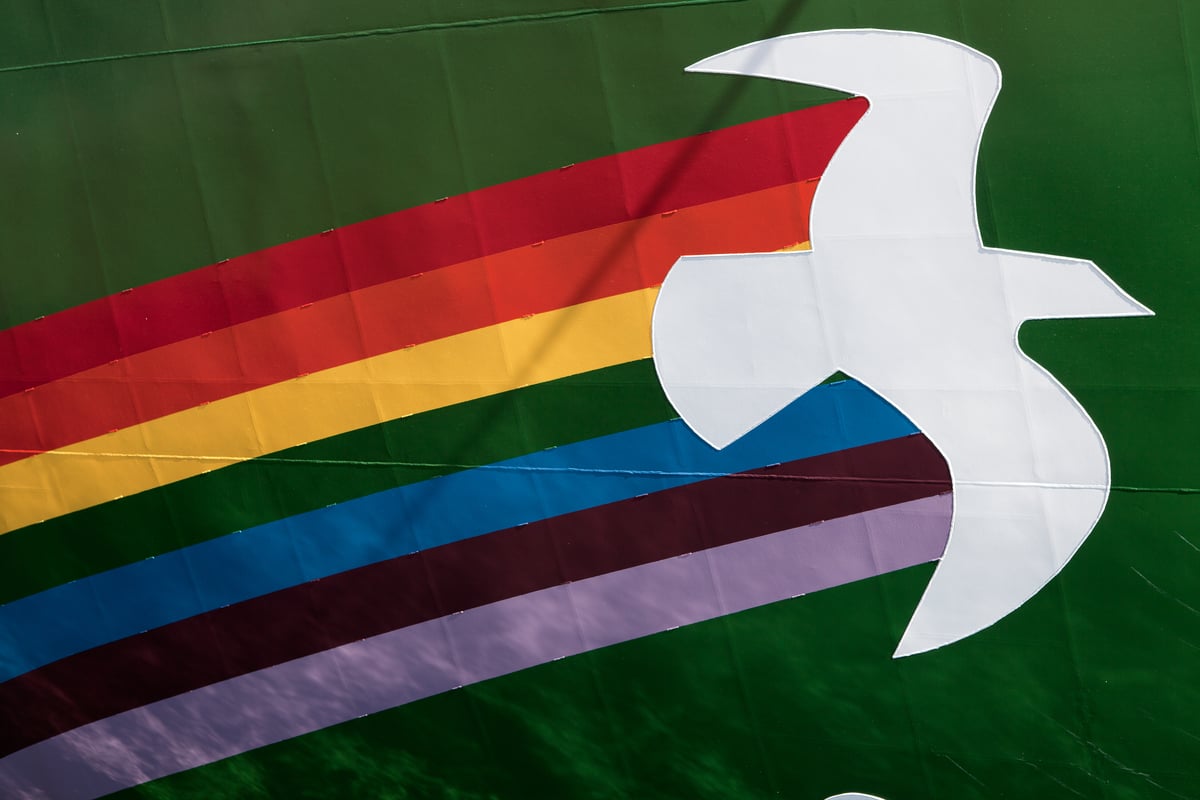Amsterdam, Netherlands — Greenpeace International (GPI) initiated the first test of the European Union’s anti-SLAPP Directive by filing a lawsuit today in Dutch court against US-based fossil fuel pipeline company Energy Transfer (ET).[1] GPI seeks to recover all damages and costs it has suffered as a result of ET’s back-to-back, meritless lawsuits demanding hundreds of millions of dollars against GPI and the Greenpeace entities in the United States.
“Energy Transfer’s pending US$300 million suit against Greenpeace International – simply for signing an open letter along with over 500 others – is a contender for most blatant SLAPP anywhere in the world. That makes it a good case on which to test the new EU anti-SLAPP Directive. If we prevail, it will send a message to corporate bullies that the age of impunity is ending. That would be a boost for civil society in the EU, and point to solutions for those battling the SLAPP phenomenon elsewhere,” said Daniel Simons, Senior Legal Counsel at Greenpeace International.
Since 2017, GPI and Greenpeace entities in the US have been defending against ET’s brazen lawsuits, filed in the wake of the 2016 Indigenous-led protests against its Dakota Access Pipeline, which ET claims were orchestrated by Greenpeace. ET’s first lawsuit was filed in federal court under the RICO Act – the Racketeer Influenced and Corrupt Organizations Act, a US federal statute designed to prosecute mob activity. The case was dismissed, with the judge stating the evidence fell “far short” of what was needed to establish a RICO enterprise. ET promptly filed a new case recycling similar arguments in a North Dakota state court, now packaged as claims for defamation, conspiracy and other torts. The jury trial is set to open on February 24. North Dakota lacks anti-SLAPP legislation, and the Greenpeace defendants would not recover their costs in full after a win – an issue today’s suit seeks to address for GPI.
Energy Transfer’s lawsuits are clear-cut examples of SLAPPs (Strategic Lawsuits Against Public Participation). Like all SLAPPs, ET’s lawsuits have been an attempt to bury nonprofits and activists in legal fees, push them towards bankruptcy and ultimately silence dissent.
“This case is a pivotal moment in the fight against SLAPPs. For too long, powerful corporations have used abusive lawsuits to silence critics and drain civil society organizations of their resources. By invoking the EU Anti-SLAPP Directive, Greenpeace International is not only defending itself but also setting a precedent that could protect activists, journalists, and advocates everywhere. A win here would send a powerful signal: SLAPPs will not go unchallenged, and those who weaponize the legal system to stifle dissent will be held accountable,” said Emma Bergmans, Member of the CASE Steering Committee and Senior Policy & Advocacy Advisor, Free Press Unlimited.
Based in the Netherlands, Greenpeace International is citing Dutch law on torts and abuse of rights, as well as Chapter V of the EU Directive, adopted in 2024, which protects organisations based in the EU against SLAPPs outside the EU, and entitles them to compensation.[2][3]] The Directive, along with existing Dutch law, paves the way for GPI to pursue remedies against three entities in ET’s corporate group, specifically Energy Transfer LP, Energy Transfer Operating LP, and Dakota Access LLC, for the damage it has suffered and continues to suffer as a result of the SLAPP suits and related actions in the US.[4] Greenpeace International sent Energy Transfer a Notice of Liability in July 2024, summoning it to withdraw its lawsuit in North Dakota and pay damages, or face legal action.[5] Energy Transfer refused to do so.
The EU’s anti-SLAPP Directive comes into force amid the fossil fuel industry’s widespread misuse of legal systems to target environmental watchdogs, and any critics, part of a wider trend of increasing SLAPPs. A report by the Coalition Against SLAPPs in Europe (CASE) documented 1,049 SLAPP suits in Europe in the period 2010-2023, with 166 lawsuits initiated in 2023.[6] Big Oil companies Shell, Total, and ENI have also filed SLAPPs against Greenpeace entities in recent years, with Shell and Total’s attempts at silencing already ending in embarrassment.[7]
ENDS
Notes:
[1] Link to summons sent by GPI to ET: English, Dutch
[3] Directive (EU) 2024/1069, Chapter V, Protection against third-country judgments
[4] The Netherlands, like all EU Member States, has until May 2026 to transpose the Directive into national law. But the Dutch government has stated existing Dutch law can and should be interpreted as giving effect to Chapter V of the Directive, with no need for amendment.
[6] Number of SLAPPs in Europe continues to rise – CASE
[7] Shell settles multimillion-dollar SLAPP lawsuit against Greenpeace – Greenpeace International;
Contacts:
Greenpeace International Press Desk, +31 (0)20 718 2470 (available 24 hours), [email protected]
Source link
Greenpeace International www.greenpeace.org

